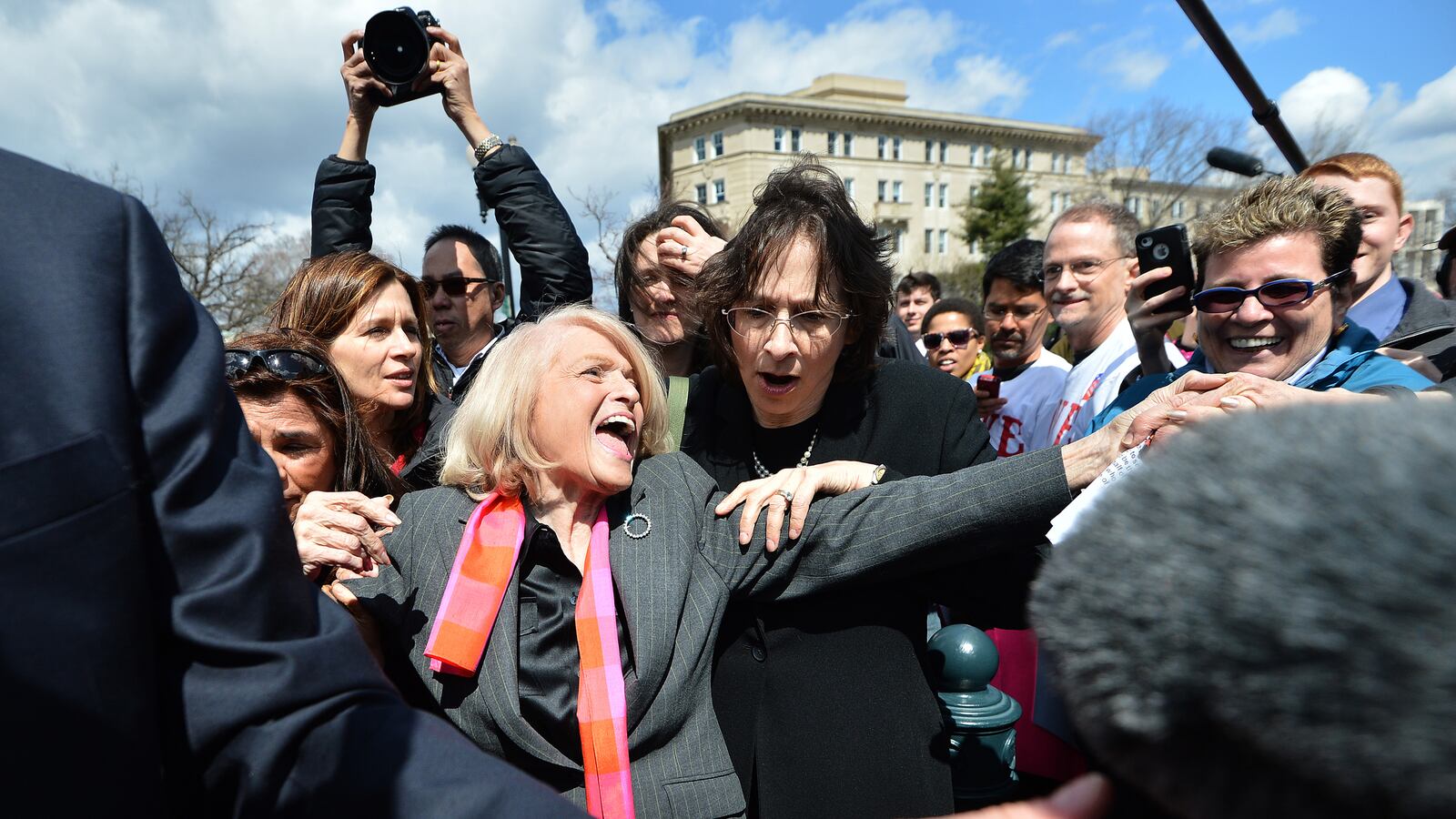It’s safe to say that no federal tax season will be greeted with as much joy and glee as next spring’s. Thanks to today’s Supreme Court rulings on gay marriage, in April 2014 gay couples residing in states where gay marriage and same-sex partnerships are legal will be able to file joint returns.

Many of the economic arguments made for gay marriage revolve around the notion of stimulus—let gay people marry, and they’ll spend money throwing fabulous bashes, providing employment to caterers, florists, and hotels. Maybe. If that money weren’t spent on weddings, it would likely be spent on other goods and services. But there’s something to be said for simply making our systems more fair and less arbitrary, regardless of the effect on national finances or employment.
Wednesday’s rulings are a step in that direction. As things go, the right of two adults to file a joint tax return, or of one adult to file a return as “head of household,” might appear to be symbolic. After all, married people often file separate returns. But it means something. Marriage is, among other things, a set of financial relationships that helps delineate how to create and preserve wealth, how to share property and pass it on, how to create financial security and deal with retirement and health care. The tax code—what we choose to tax, which activities get preferential treatment, which activities are singled out for opprobrium—actually says a lot about us as a society.
And until today, the federal tax code generally treated gay people as second-class citizens.
The case that helped bring down the Defense of Marriage Act, was, at root, a tax case. When Thea Spyer died in 2009, her partner, Edith Windsor, was angered that she was liable for federal estate taxes on assets left to her by Spyer. Instead of benefiting from the provision of the Internal Revenue Code that lets spouses inherit unlimited amounts of assets from predeceased spouses, Windsor received a federal-estate-tax exemption on only the first $3.5 million of assets. On the sums above that amount, Windsor had to pay more than $363,000 in federal estate taxes.
It sounds like a 1 percent problem. But there’s a principle at stake here. Because it refused to recognize her marriage as valid, the federal government essentially confiscated a chunk of Windsor’s property. And the government’s refusal to recognize gay marriage as legitimate enshrined this attitude throughout the tax code.
Check out the IRS’s FAQs for same-sex couples:
Q: Can same-sex partners who are legally married for state law purposes file federal tax returns using a married filing jointly or married filing separately status?
A: No. Same-sex partners may not file using a married filing separately or jointly filing status because federal law does not treat same-sex partners as married for federal tax purposes.
Well, from here on out, federal law will treat same-sex partners as married for federal tax purposes. Of course, the decision isn’t all good financial news for gay couples. Sure, many will now be able to claim estate-tax exemptions and other deductions that until now only applied to heterosexual couples. And dealing with issues such as benefits and insurance is likely to get much easier. But as the joke goes, gay couples will now have to deal with all the irritation and challenges of heterosexual marriage. And that includes an education on the absurd twist in the tax code know as the “marriage penalty.” (No, it’s not when you have to share control of the television remote.) If two single people each earn $50,000, they will each pay the marginal tax rate that applies to $50,000. If they are married and declared a combined income of $100,000, however, they will be pushed into a higher tax bracket.
From a budgetary perspective, gay marriage is likely to be a wash—some filers will wind up paying lower taxes, and some will wind up paying higher taxes. But we’ll all gain by living in a more just and equal society. Here’s something that is often forgotten in the discourse over the IRS: paying taxes and filing federal tax returns doesn’t make you a chump. It makes you a citizen. Claiming legal benefits and deductions doesn’t make you a crook. It makes you a citizen. In effect, the Supreme Court today told Windsor that she’s a full citizen of the United States, with all the rights, responsibilities, tax breaks, and tax obligations that obtain thereto.






